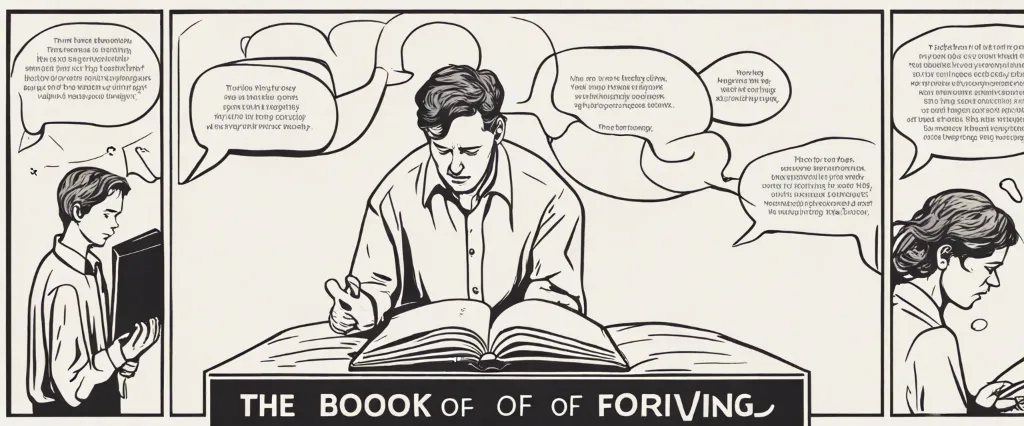——The Book of Forgiving by Desmond M. Tutu & The Consolations of Philosophy by Alain de Botton

In the realm of literature and philosophical contemplation, certain works have the profound ability to touch our hearts, challenge our perspectives, and offer solace in times of adversity. Two such powerful texts that explore the complexities of the human experience and the pursuit of peace within ourselves are “The Book of Forgiving” by Desmond M. Tutu and “The Consolations of Philosophy” by Alain de Botton.
Desmond M. Tutu, an iconic figure in the quest for justice and reconciliation, draws upon his firsthand experiences as an anti-apartheid activist and Anglican bishop to present a guidebook on forgiveness. Tutu delves into the depths of forgiveness by intertwining personal anecdotes, historical events, and spiritual principles. On the other hand, Alain de Botton, a renowned modern philosopher, offers a remedy for our emotional, existential crises through his examination of significant philosophical ideas and the wisdom they can bestow upon us.
While their themes differ, both “The Book of Forgiving” and “The Consolations of Philosophy” share a common thread—the fundamental struggle to find inner peace and understanding in a complex and often unjust world. Tutu implores readers to embark on a transformational journey toward freedom from the shackles of anger and pain, emphasizing the importance of empathy, acknowledgment, and genuine reconciliation. Conversely, de Botton seeks solace in the timeless wisdom of philosophers such as Socrates, Nietzsche, and Montaigne, revealing how their insights can offer consolation and perspective on our universal human struggles.
Through a comparative analysis, this study aims to delve into the intricate web of narratives, philosophical concepts, and emotional nuances presented within these captivating works. By examining the unique approaches taken by Tutu and de Botton, we hope to uncover the contrasting and complementary ways in which forgiveness and philosophy intersect in their pursuit of personal growth, healing, and ultimately, the attainment of a deeper sense of meaning in life.
In doing so, this comparative study offers a lens through which we can explore how different lenses of understanding can combine to shed light on the intricate tangle of human existence. Through the exploration of forgiveness and philosophy, we seek to illuminate pathways towards empathy, self-reflection, and the realization of our shared humanity.
Brief Summary of Two Books
The Book of Forgiving by Desmond M. Tutu
“The Book of Forgiving” by Desmond M. Tutu, co-authored with his daughter Mpho Tutu, is an exploration of the transformative power of forgiveness. Inspired by Tutu’s experiences as the Chair of the South African Truth and Reconciliation Commission, this book provides a practical guide and framework for forgiveness.
The book begins by sharing Desmond Tutu’s personal story of forgiveness and his encounters with victims of apartheid. Tutu emphasizes that forgiveness does not mean condoning or forgetting the harm caused, but rather acknowledging the pain and finding ways to heal and move forward.
The authors explain the Fourfold Path of Forgiveness, which consists of telling the story, naming the hurt, granting forgiveness, and renewing or releasing the relationship. They provide guidance on each step, offering personal anecdotes, reflections, and exercises for readers to engage with their own forgiveness journey.
Throughout the book, Tutu highlights the psychology and spiritual aspects of forgiveness, exploring its benefits not only for those who forgive but also for societies as a whole. He argues that forgiveness has the power to break the cycle of violence and bring about reconciliation, healing, and lasting peace.
The Book of Forgiving” also addresses the challenges people face in forgiving, such as anger, bitterness, and doubts. Tutu shares practical strategies to overcome these obstacles and provides insights into the importance of self-forgiveness and the role of empathy in the process.
In summary, “The Book of Forgiving” is a powerful and compassionate guide that teaches readers how to find forgiveness, reconciliation, and ultimately, inner peace. Through stories, reflections, and practical exercises, Desmond Tutu shows that forgiveness is not only possible but necessary for personal and societal transformation.
The Consolations of Philosophy by Alain de Botton
The Consolations of Philosophy” by Alain de Botton is a book that aims to provide comfort and guidance to individuals facing various life challenges by using the teachings of influential philosophers throughout history. De Botton explores the ideas of philosophers such as Socrates, Epicurus, Seneca, Montaigne, Schopenhauer, and Nietzsche, shedding light on their concepts and applying them to daily struggles faced by modern individuals.
Through the exploration of different philosophical ideas, the book addresses common human experiences such as unrequited love, frustration in the workplace, the pain of not reaching our ambitions, facing mortality, and the quest for happiness. De Botton delves into the practical wisdom offered by these philosophers, presenting their insights in an accessible and relatable way.
For instance, when discussing Socrates, the author emphasizes the importance of self-knowledge and questioning one’s assumptions. Epicurus, on the other hand, encourages us to embrace simplicity and appreciate the pleasures of everyday life. In exploring the thoughts of Seneca, de Botton highlights the value of embracing setbacks and finding strength in adversity. Montaigne’s philosophy teaches us to embrace our flaws and accept imperfections. Schopenhauer confronts us with the inevitability of suffering and suggests finding solace in aesthetics and art. Finally, Nietzsche encourages us to create our own values and live authentically, challenging societal norms.
“The Consolations of Philosophy” aims to show that philosophy is not just an abstract field of study but also holds the capacity to positively impact our lives. It presents the ideas of these philosophers as a means to confront and make sense of the challenges that life throws at us, ultimately providing solace, guidance, and a deeper understanding of our own existence.
Comparison between Two Books

Similarities in Psychological Healing
The Book of Forgiving by Desmond M. Tutu and The Consolations of Philosophy by Alain de Botton both discuss the concept of psychological healing in profound and enlightening ways. While the books focus on different aspects of healing, they share several similarities in terms of their approach and perspective.
1. Exploring the human experience of suffering: Both Tutu and de Botton acknowledge that suffering is an inherent part of the human condition. They delve into the depths of human suffering, discussing various forms of pain and trauma, and emphasize the importance of acknowledging and understanding these experiences as a crucial step toward psychological healing.
2. Advancing the power of forgiveness: Forgiveness is a central theme in both books. Tutu and de Botton emphasize that forgiveness is not an easy process but a transformative act of releasing anger, bitterness, and resentment. They demonstrate the profound impact forgiving others can have on one’s psychological well-being, allowing individuals to move forward and find healing.
3. Drawing on philosophical insights: Both authors draw heavily on philosophical concepts and insights to support their ideas about psychological healing. Tutu weaves in principles of Ubuntu, a South African philosophy emphasizing interconnectedness and empathy, while de Botton delves into the teachings of ancient philosophers such as Socrates, Seneca, and Nietzsche. By grounding their ideas in philosophical wisdom, both authors provide a framework for understanding the human mind and offering guidance for healing.
4. Encouraging self-reflection and introspection: Tutu and de Botton stress the importance of self-reflection and introspection in the healing process. They encourage readers to engage in deep contemplation and analysis of their own thoughts, emotions, and behaviors. By engaging in this self-exploration, individuals can gain a better understanding of the underlying causes of their pain and find pathways toward healing.
5. Promoting empathy and compassion: Both books stress the role of empathy and compassion in the process of psychological healing. Tutu highlights the transformative power of empathy and encourages readers to embrace the pain of others as their own. De Botton emphasizes the importance of compassionate self-understanding and seeks to build empathy by sharing stories and experiences that readers can relate to.
In summary, both The Book of Forgiving by Desmond M. Tutu and The Consolations of Philosophy by Alain de Botton delve into the realm of psychological healing by exploring suffering, forgiveness, philosophical insights, self-reflection, and the power of empathy. These shared themes demonstrate the similarities in their approach to addressing psychological wounds and finding ways to move toward healing.
Divergences in Psychological Healing
The Book of Forgiving by Desmond M. Tutu and The Consolations of Philosophy by Alain de Botton tackle different aspects of psychological healing, but they share a common goal of offering guidance and comfort to individuals in need. However, they approach this topic from divergent perspectives.
In The Book of Forgiving, Tutu focuses on the concept of forgiveness as a means of psychological healing and liberation. He draws upon his experiences as a South African Archbishop and his involvement in the Truth and Reconciliation Commission, using real-life stories to illustrate the transformative power of forgiveness. Tutu emphasizes that forgiveness is a choice, and it is crucial for individuals to acknowledge their pain, anger, and desire for justice before moving towards forgiveness. He highlights the importance of empathy, compassion, and the recognition of shared humanity as key elements in the forgiveness process. Tutu’s approach to psychological healing centers on the belief that forgiveness allows individuals to move forward, release emotional burdens, and ultimately experience inner peace.
On the other hand, in The Consolations of Philosophy, de Botton explores the therapeutic potential of philosophy for cultivating psychological healing. De Botton recognizes that individuals often encounter suffering, anxiety, and despair throughout their lives. He argues that philosophy can offer solace and guidance during these difficult times. Drawing upon the ideas of various philosophers including Socrates, Nietzsche, and Epicurus, de Botton relates philosophical concepts to modern challenges. He explores the role of philosophy in helping individuals confront, understand, and overcome adversity. De Botton’s approach to psychological healing through philosophy centers on the belief that understanding and contemplating philosophical ideas can bring comfort, clarity, and a sense of perspective to individuals facing personal struggles.
In summary, while both The Book of Forgiving and The Consolations of Philosophy explore the theme of psychological healing, they diverge in their respective approaches. Tutu emphasizes forgiveness as a transformative and liberating force, rooted in empathy and compassion. Meanwhile, de Botton focuses on the therapeutic potential of philosophy, offering solace and guidance through the contemplation and understanding of philosophical concepts. Both books provide valuable insights and strategies for emotional well-being, albeit from distinct perspectives and methodologies.

Conclusion
Both The Book of Forgiving by Desmond M. Tutu and The Consolations of Philosophy by Alain de Botton are highly regarded books that offer valuable insights. The choice between the two books ultimately depends on your personal interests and what you are seeking from your reading experience.
If you are interested in exploring the theme of forgiveness and its transformative power, The Book of Forgiving by Desmond M. Tutu is an excellent choice. Tutu, a renowned South African human rights activist and Nobel Peace Prize laureate, delves into the complexities of forgiveness, sharing personal stories and wisdom to guide readers on their own journeys of forgiveness.
On the other hand, if you are more inclined towards philosophy and seeking solace in life’s challenges, The Consolations of Philosophy by Alain de Botton might resonate with you. De Botton explores the works of various philosophers, including Socrates, Nietzsche, and Montaigne, and extracts practical lessons to help us navigate difficult emotions, relationships, and existential dilemmas.
Both books offer unique perspectives and have garnered praise for their insights and thoughtfulness. It would be worthwhile to consider your personal interests and areas of curiosity when making a decision between the two.


